Anuradha D. Rajurkar's Blog
April 20, 2025
Releasing the Truth That is Uniquely Yours: What Goddess Kali Taught Me About Writing
Are you there, Goddess Kali?
I was lying in the yard, face down in the grass. The October sun was warm upon my back and the earth smelled like recent rain. Our rescue puppy, Cleo, bounded up, delighted to see me sprawled across her turf. She gazed into my face with curiosity, licked my cheek, and settled beside me. I was in creative slump mode, and she was here to ride it out.
Kali? It’s me, Anuradha. I need to rock this revision, but I’m beat. Thoughts?
Kali is a Hindu warrior goddess who symbolizes both the creative and destructive forces of nature—and she has woven her way into my next novel.

Known for being fierce but nurturing, she takes no garbage and gets things done. When feeling stuck creatively, I envision her and it helps.
Sometimes.
The truth is my life was undergoing immense change, and overwhelm was becoming my new best friend. Soon after the publication of my debut novel, my family and I moved to Evanston, my hometown, after 30 years away. Despite the challenges of a major move, exciting things were happening: My second novel was acquired on proposal, I was invited to contribute short stories to two anthologies, I secured a full-time job in academia, and we now lived close to family. Life was good. Exhausting, but good.
As I threw myself into the research for my second novel, a gothic thriller set in India, I stumbled upon Goddess Kali. With her indigo skin and wild black hair, she rides a tiger while defeating obstacles in her path with her scythe.
I found myself channeling this symbol of wild, feminine empowerment whenever I became creatively disconnected. Which, as it turned out, was often.
Kali? Halp!
I like to believe she heard me, because I learned some tricks—ones that have helped me reclaim my creative energy and writing joy. Here’s what worked:
Voice Memo Nature WalksI set an intention: during my daily walks with Cleo, I record voice memos about my WIP (work in progress). I’m not going to lie: Walking Cleo as she hind-leg-lurch-hops at every living thing we pass while I juggle treats, poop bags, my thoughts, and my phone is a lot. But eventually, we hit our stride. These walks help me generate character motivations, plot twists, and new story ideas. Voice memos allow me to stay in close connection with my WIP while physically away from my computer. Plus, it invites Cleo into my process, which she values.
Building a Writing CommunityConnecting with other writers and illustrators brings fresh energy to my creative life. Whether it’s meeting with my critique partners to discuss our WIPs or supporting new writers, meeting with other creators makes my heart happy. And tips I’ve gleaned and shared?
A) Story Genius and Save the Cat Writes a Novel help sculpt strong pitches and outlines.
B) A clear strategy is essential when querying agents (thanks, Manuscript Wishlist and Publishers Marketplace, for existing).
And C) sometimes, cheerleading is everything (You wrote a beautiful book and you rock!). Participating in others’ artistic journeys is fulfilling—and inspires me to reengage with my own.
Living BookmarksWhen I feel stuck, I fold a piece of paper, grab a pen, flop down, and read, writing sentences I love on this “living bookmark.”
When I feel stuck, I fold a piece of paper, grab a pen, flop down, and read, writing sentences I love on this “living bookmark.” After finishing the book, I have its highlights captured. I keep this bookmark close as I tinker with word choice or sentence structure in my own work. Just as musicians craft songs from samples, writers can use mentor texts in similar ways. Words are our first loves—and our tools. Studying how your favorite writers wield them will bring out the magic in your writing.
GroundingIn drafting a story for an environmental activism anthology edited by Nora Carpenter, I came across the concept of grounding (or earthing). The idea is based in Native American understanding of the natural world, its essence being this: when our bodies connect with the ground, we link with the Earth’s electrical energy. Syncing with the Earth’s natural frequencies positively impacts our bodies, health, and mood. When I became intentional about earthing—being barefoot outdoors, lying in the grass, and gardening with my bare hands—I began to gain a sense of balance and well-being. After all, Goddess Kali—divine Mother Earth—already knows and practices this.
Love Little YouA friend shared that she props at her desk a photo of herself as a girl as a reminder to treat her inner child with empathy and compassion. I discovered that it’s much harder to berate myself for a writing slump with little me staring back at me.
A friend shared that she props at her desk a photo of herself as a girl as a reminder to treat her inner child with empathy and compassion. I discovered that it’s much harder to berate myself for a writing slump with little me staring back at me. Plus, centering my inner kid helps me write with young people in mind.
Art ImmersionOn a recent trip to Miami, I saw an art installation featuring green geckos. It struck me like a bolt: lizards! The perfect metaphor to thread through my gothic—and the puzzle piece I was missing. When we view writing as an art form that’s linked to other art forms, we find inspiration everywhere: a street mural, a song lyric, a vintage dress, a stained-glass transom in a coffee shop. Even bingeing a television series allows us to examine plot, characterization, and pacing. So, take in art in all its forms. It might just be what’s needed to unlock your WIP.
When we view writing as an art form that’s linked to other art forms, we find inspiration everywhere: a street mural, a song lyric, a vintage dress, a stained-glass transom in a coffee shop.
Drawing Power from Your AncestorsWhen calling on Kali wasn’t working, a friend offered this: “Maybe you’re too tired for warrior-ing. What if you envisioned being cheered on by your ancestors?” I thought of my late grandmother—the warmth of her hand on mine, her earthy chuckle. The pride in my late grandfather’s eyes when I told him I wanted to be a writer. Anu, you are a writer, and writers must write. Go on, now! New ideas flickered, fireflies in a velvet sky. The concept of my ancestors wanting for me what I want for myself motivates me to keep going.
The concept of my ancestors wanting for me what I want for myself motivates me to keep going.
Study Artists’ ObsessionsReading about and hearing from artists about their work lend insight into the artistic process. This intentional practice reminds me that we are part of a creative collective, and that ebbs are normal—that there’s even beauty in the wrangling. So read the arts sections. Visit the local knitting shop. Attend concerts, absorbing the stories the musicians share behind their songs. Check out maker fairs, asking artists about their stories. It supports artists on their journeys and reconnects you with your own.
Check out maker fairs, asking artists about their stories. It supports artists on their journeys and reconnects you with your own.
Becoming your Own Best Friend and Other TherapiesSetting small goals while speaking lovingly to my brain is a technique shared by a dear friend who is a life coach. Stuff like: Yes, this is tough, but I have faith in you. You can rest when you need to, and we’ll get this done. You got this! This technique settles the nervous system down enough that you can focus. And once you reach the goal, celebrate yourself. Other therapies that remap negative mind-patterns are cognitive behavioral therapy (CBT), dialectical behavior therapy (DBT), and emotional freedom technique (EFT), to name a few. Each help form healthier neural pathways. Your brain—and creative practice—will thank you.
Facing your Authentic SelfOften we torment ourselves over creating, like it’s a monster to control or vanquish. But at its heart, creating means connecting with your core self. In researching Goddess Kali, I learned she is known to release in you the truth that is uniquely yours—the stuff of great writing. Kali embraces duality: She is terrifying but loving. She destroys but eradicates evil in protection of children. This ultimate mother also symbolizes the force of time, death, rebirth. She is filled with paradox, as are we all. Honoring my inner Kali helps me write from a place of authenticity—a safe space to process honest queries, deep fears, high hopes. So, as you write, embrace your truth. Kali’s got your back.
A month later, I lay with Cleo in the grass in my puffy coat, staring at the bare ivy vines crosshatched along the side of the house. Their leaves have fallen, decomposing into the black earth as kickoff to an expansive winter. But in time, Kali will sweep through with her warmth, her green shoots, her leaves and her flowers. Destruction, fallow times, rebirth—nature’s cycle.
Goddess Kali reminds me that we, too, are nature. That our creative power rises after rest. After the destruction of old habits that no longer serve us. That to create, we must immerse ourselves with whatever it is that feeds the soul. Kali has helped me understand that only with the intentional care of your spirit can you then release the truth that is uniquely yours.
You are a writer, and writers must write.
November 5, 2022
Library Love for American Betiya!
September 8, 2022
Book Mail~Twice as Perfect by Louisa Onome
Book mail!! Finally got to lose myself in this new beauty by @louisaonome and am it is everything! I adore honest contemporary stories that feature family love and the pressures of being part of the diaspora, brimming with friendship, humor and heart. TWICE AS PERFECT has it all and more. I’m in love!
“For seventeen-year-old Adanna Nkwachi, life is all about duty: to school and the debate team, to her Nigerian parents, and even to her cousin Genny as Adanna helps prepare Genny’s wedding to Afrobeats superstar Skeleboy. Because ever since her older brother, Sam, had a fight with their parents a few years ago and disappeared, somebody had to fill the void he left behind. Adanna may never understand what caused Sam to leave home, but the one thing she knows is that it’s on her to make sure her parents’ sacrifices aren’t in vain.
One day, chance brings the siblings together again.although she fears how her parents will react if they find out she and Sam are back in touch, Adanna is determined to get answers about the night Sam left—Sam, who was supposed to be an engineer but is now, what, a poet? The more she learns about Sam’s poetry, the more Adanna begins to wonder of maybe her own happiness is just as important as doing what’s expected of her. Amid parental pressure, anxiety over the debate competition, a complicated love life, and the Nigerian wedding-to-end-all-weddings, can Adanna learn, just this once, to put herself first?”
And…It’s out now! Congratulations on this gorgeous novel, Louisa Onome! I’m savoring every moment of it. 😍😍😍
August 22, 2022
Devi from "Never Have I Ever" would read American Betiya, according to Browngirl Bookshelf
When I first saw "Never Have I Ever," I fell in love with Devi for the kind of kindred spirit she is. And I couldn’t help but think that Devi would vibe with American Betiya for its honest, on-page explorations of sex, immigrant family dynamics (read: at all costs, keep those boyfriends a secret from your South Asian mom), empowering female friendships, cultural exchange vs cultural appropriation, and humor amid painful experiences. Devi, I wrote American Betiya for girls like us.
Check out my post on my Instagram page for more of Browngirl Bookshelf's book recs for the other beloveds of this one-of-a-kind show that has stolen our hearts. These books include titles by gifted authors: Saumya Dave, Poorna Bell and Vauhini Vara ♥️
Thank you, Browngirlbookshelf !
Devi from "Never Have I Ever" would read American Betiya, according to Browngirl Bookshelf
YAY! @browngirlbookshelf on Instagram created a post of their book recommendations for the beloved characters of Mindy Kaling's Netflix series "Never Have I Ever," and AMERICAN BETIYA is their pick for the show’s flawed & lovable heroine Devi, played by the brilliant Maitreyi Ramakrishnan !🤯😭♥️
When I first saw "Never Have I Ever," I fell in love with Devi for the kind of kindred spirit she is. And I couldn’t help but think that Devi would vibe with American Betiya for its honest, on-page explorations of sex, immigrant family dynamics (read: at all costs, keep those boyfriends a secret from your South Asian mom), empowering female friendships, cultural exchange vs cultural appropriation, and humor amid painful experiences. Devi, I wrote American Betiya for girls like us. 🤩
Check out @browngirlbookshelf’s post on their Instagram page for their book recs for the other beloveds of this one-of-a-kind show that has stolen our hearts. These books include titles by gifted authors: Saumya Dave, Poorna Bell and Vauhini Vara ♥️
Thank you, @browngirlbookshelf !
August 5, 2022
Announcing Book 2 with Knopf: TEMPORARY BODIES!
Friends! Overjoyed to finally share: I get to publish another book w Knopf! It’s entitled TEMPORARY BODIES, a YA gothic thriller featuring ghosts, goddesses, and generational secrets set on a lush Indian estate rife w colonial history, & I hope you become as obsessed with it as I have!
This is a story that features sisterhood, empowering romance and sensuality, and a narrator that's as wild and fierce as she is unreliable.
Deep gratitude to my brilliant editors Katherine Harrison & Gianna Lakenauth, and my fierce supporter & insightful agent Alex Slater with Greenburger Kids! So proud to be a part of this fabulous team 😭😍
Bear hugs to my family & friends for fueling me with love every step of the way, my supportive writing community, and my utterly amazing readers, without whom this would not be possible 😍
Please consider signing up for my quarterly newsletter if you haven't already, for: 1) sneak peeks into the writing of this baby, 2) thoughts on the creative process, 3) insights into publishing, and 4) exclusive bookish gifts offered only to my subscribers! I promise I won't inundate you with too many messages and will love you forever, so sign up here at https://www.anuradharajurkar.com!
Dark thrills on the way! 🖤🧿🖤
With love,
Anuradha
August 4, 2022
Announcing Book Two with Knopf: TEMPORARY BODIES!

Friends! Overjoyed to finally share: I get to publish another book w Knopf! It’s entitled TEMPORARY BODIES, a YA gothic thriller featuring ghosts, goddesses, and generational secrets set on a lush Indian estate rife w colonial history, & I hope you become as obsessed with it as I have!
This is a story that features sisterhood, empowering romance and sensuality, and a narrator that's as wild and fierce as she is unreliable.
Deep gratitude to my brilliant editors Katherine Harrison & Gianna Lakenauth, and my fierce supporter & insightful agent Alex Slater with Greenburger Kids! So proud to be a part of this fabulous team 😭😍
Bear hugs to my family & friends for fueling me with love every step of the way, my supportive writing community, and my utterly amazing readers, without whom this would not be possible 😍
Please consider signing up for my quarterly newsletter if you haven't already, for: 1) sneak peeks into the writing of this baby, 2) thoughts on the creative process, and 3) exclusive bookish offered only to my subscribers!
Dark thrills on the way! 🖤🧿🖤
With love,
Anuradha
May 10, 2021
Feminist YA and MG Debuts of 2021~ 14 Authors Share their POV by Aurora Dominguez with Frolic
 Feminist YA and MG Debuts of 2021: 14 Authors Share their POV
Feminist YA and MG Debuts of 2021: 14 Authors Share their POV
 By: Aurora DominguezApril 19, 2021
By: Aurora DominguezApril 19, 2021[Note from Frolic: Our resident YA expert Aurora got the chance to chat with 14 YA and MG authors and chat with them about feminism and more. Read on to find your new favorite authors!]
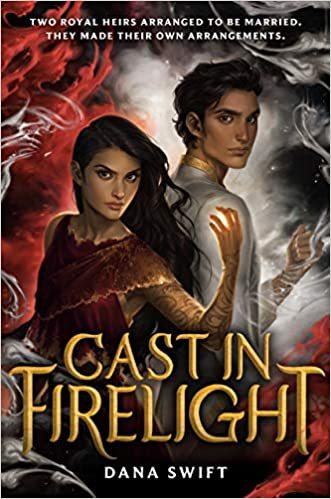 Author Dana Swift says…
Describe the content of your latest book and what can readers expect from it.
Author Dana Swift says…
Describe the content of your latest book and what can readers expect from it.Cast in Firelight is a dual point of view YA Fantasy Romance about Adraa and Jatin, two teens arranged to be married who after years of rivalry meet once again and mistakenly think they are someone else. When Adraa discovers her magic is being stolen, the two team up as vigilantes to save their countries, not knowing who they are working with and just maybe, falling for. It’s a mash-up of rom-com shengahians and superhero-esque fantasy action.
As a debut author, what advice would you give aspiring authors who want to write but might be afraid to try to start their own written story?Everyone has a unique voice and I can guarantee someone out there wants the kind of story you are writing. So above all else, believe in yourself. I think we all doubt ourselves, but it always helps me to reconnect to the fun and joy in writing and creating stories.
What does feminism mean to you? How does a character in your book represent feminism?To me feminism is empowering, inspiring, and liberating. Most of all it’s about equality, in letting girls and women be whoever they want to be without judgement. In Cast in Firelight many of my characters wear more than one mask (literally) and they find themselves not by choosing one persona over the other, but through embracing all the different aspects of their identity.
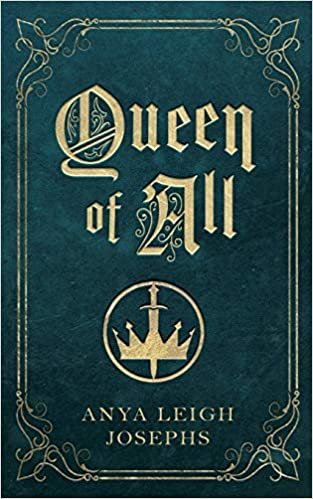 Author Anya Leigh Josephs Says…
Describe the content of your latest book and what can readers expect from it.
Author Anya Leigh Josephs Says…
Describe the content of your latest book and what can readers expect from it.Queen of All is a classic YA fantasy with an intersectional feminist twist. It’s the story of an ordinary girl discovering her magic and coming into her power, while also learning to accept her plus-sized body, her anxious brain, and her lesbian identity. Readers can expect to be swept up in a story of adventure, friendship, and magic, and also enjoy representation for many people often excluded from fantasy storytelling.
As a debut author, what advice would you give aspiring authors who want to write but might be afraid to try to start their own written story?Really sit with that fear and ask what it can teach you. Your story can be so many different things–it can be just for you, or shared only with friends, or independently or self-published, or in every bookstore in America, and you can choose how far you want to pursue that path. Which of those things–which step along the many paths of writing and publishing–scares you? You never have to confront that fear if you don’t want to, but you always can if you decide it’s worth it to you. (Also, no one can write your story but you! Sorry, but if you want it written, you’re gonna have to give it a try yourself).
What does feminism mean to you? How does a character in your book represent feminism?Feminism is, quite simply, the idea that all genders should be treated equally by society, and the work of advocating for this to happen. I think Queen of All will be an appealing book for feminists because its characters show the different ways of being a feminist advocate. Sisi is a character who is much more of an “activist”–a rebel who questions the systems she lives in and struggles against them. Jena, the protagonist, is much more of a quiet character, who eventually finds her role as a feminist in being her true self. These characters, and more, show that anyone, no matter who they are or how they relate to others, can be a feminist and make a difference in their world.
 Author Carly Heath Says…
Describe the content of your latest book and what can readers expect from it.
Author Carly Heath Says…
Describe the content of your latest book and what can readers expect from it.Set in 1904, The Reckless Kind follows a trio of queer teens who decide to defy the expectations of their rural Scandinavian village by leaving their families, living on their own, and challenging the town’s patriarch in the region’s annual winter horse race. Readers can expect a wonderfully supportive queerplatonic triad at the center of this book—three teens working hard to figure out how to make their unconventional family work while flying in the face of small town tradition.
As a debut author, what advice would you give aspiring authors who want to write but might be afraid to try to start their own written story?Your voice is important and your story is worth the time you put into it. Set a weekly goal and reward yourself for meeting your goal. Even if it’s something small like 500 words per week, just set that goal and make regular progress. A reward system like “every time I hit 10,000 words, I’ll buy myself a bracelet” really goes a long way to helping you stay on track.
What does feminism mean to you? How does a character in your book represent feminism?I believe feminism should be about examining and dismantling the social and economic structures in place that benefit some at the expense of everyone else. Asta, the main character in The Reckless Kind, doesn’t conform to conventional standards of beauty and she’s not “receptive” in the way her society thinks women should be—she’s hard of hearing, asexual, and doesn’t want to get married or have children. Though faced with societal pressure that leads to personal doubts, she ultimately is able to triumph against those who seek to limit her, and she finds allies who affirm her unconventional desires.
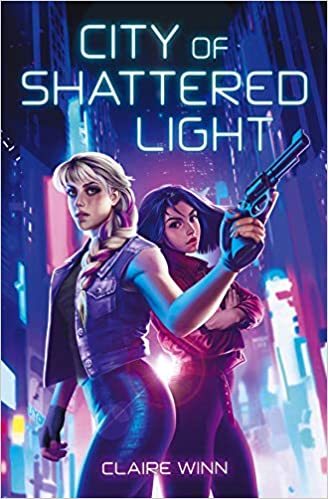 Author Claire Winn Says…
Describe the content of your latest book and what can readers expect from it.
Author Claire Winn Says…
Describe the content of your latest book and what can readers expect from it.City of Shattered Light is a graffiti-smeared, neon-drenched fever dream led by two fierce girls—a runaway heiress, Asa, who’s fled home to save her test-subject sister, and Riven, a gunslinging smuggler who needs a hell of a bounty to secure her place in one of the city’s matriarchal crime syndicates. The girls clash when one kidnaps the other (oops), but they end up with bigger problems when a brilliant, tech-corrupting A.I. monster locks down the city and begins pursuing them. The book is infused with so many of my favorite things—glowing-but-grimy settings, a ride-or-die misfit team (mostly queer characters, including two bisexual leads), heist banter, and strong character relationships.
As a debut author, what advice would you give aspiring authors who want to write but might be afraid to try to start their own written story?Start with a story you love. Writing a book is a long, uncertain, and lonely path, and the only guaranteed fan you’ll ever have—and the one spending the most time with the story—is you. Plus, a story you’re in love with will feel authentic, and it means there’s a greater chance it’ll find readers who love it. So write a book you’re passionate about and pour your heart into it, even if it feels daunting.
What does feminism mean to you? How does a character in your book represent feminism?To me, feminism is about giving women and girls the freedom to make choices and pursue goals without gender-based hurdles or scrutiny. It’s about ending sexual violence, as well as valuing and supporting women of all races, abilities, and backgrounds. CoSL features a range of flawed, messy women with different talents and backgrounds, all driving the story and making things happen. A major theme of Asa’s character arc is self-discovery. She learns to break free of toxic societal expectations, discovers her own talents and desires, and ultimately becomes a person she’s chosen for herself.
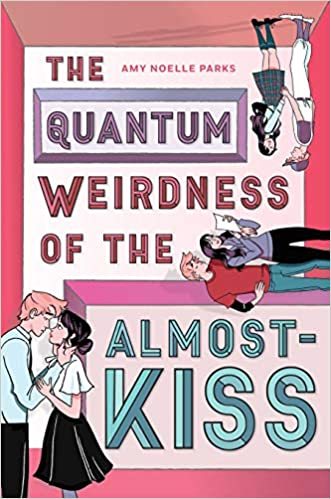 Author Amy Noelle Parks Says…
Describe the content of your latest book and what can readers expect from it.
Author Amy Noelle Parks Says…
Describe the content of your latest book and what can readers expect from it.The Quantum Weirdness of the Almost-Kiss is a dual point-of-view romantic comedy about Evie, a mathy, anxious girl, and Caleb, the boy who’s been in love with her most of his life. When Evie decides she’s ready to try dating for the first time, shenanigans ensue.
As a debut author, what advice would you give aspiring authors who want to write but might be afraid to try to start their own written story?My advice to new writers would be to write for yourself first. If you love your story, there’s a decent chance someone else will too, and if not, at least you’ve had the pleasure of creating a world you’re happy to live in.
What does feminism mean to you? How does a character in your book represent feminism?For me, feminism in young adult novels is about providing a space for all young people, but particularly girls, to negotiate who they want to be in the world. As a young mathematician, Evie is definitely learning to navigate male-dominated spaces, but she’s also figuring out who she wants to be as a friend and a romantic partner, and that’s feminist work too.
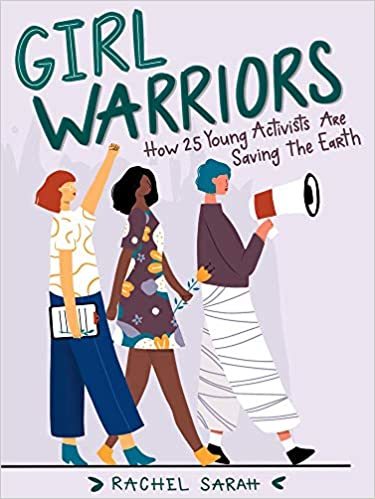 Author Rachel Sarah Says…
Describe the content of your latest book and what can readers expect from it.
Author Rachel Sarah Says…
Describe the content of your latest book and what can readers expect from it.A call to action and a hopeful march through the lives of the world’s extraordinary youth leaders, Girl Warriors: How 25 Young Activists Are Saving the Earth (Chicago Review Press – April 6, 2021) is a middle grade nonfiction book that will ignite and inspire people of all ages. From Ireland and Pakistan to Colombia and Uganda, Girl Warriors spotlights climate activists from all around the world who are sounding the alarm for their futures.
Girl Warriors tells the stories of 25 climate activists under 25 who are showing up, speaking up, and rising up. Kirkus just gave Girl Warriors a starred review! (“Engaging, brilliant, and intersectional: a must for shelves everywhere.”)
As a debut author, what advice would you give aspiring authors who want to write but might be afraid to try to start their own written story?Your story matters. Please know this. Surround yourself with people who believe in you. (This might not be your family of origin!) Writing takes so much perseverance, so having your people around you to lift you up and love you is vital.
What does feminism mean to you? How does a character in your book represent feminism?Feminism means rising up for radical change. All of the girls and young women in Girl Warriors are real-life feminists on the frontlines! I’m so grateful that I had the opportunity to interview the activists who are rising up for their futures all over the world as they organize movements and dismantle systems of oppression amidst a global pandemic.
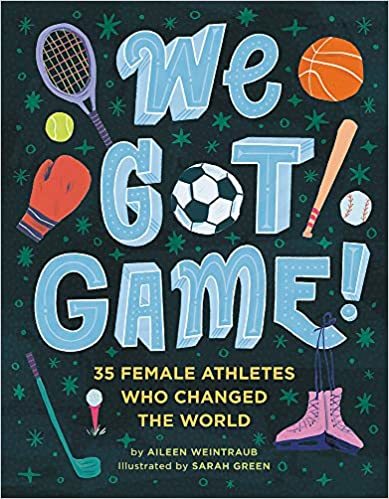 Author Aileen Weintraub Says…
Describe the content of your latest book and what can readers expect from it.
Author Aileen Weintraub Says…
Describe the content of your latest book and what can readers expect from it.WE GOT GAME! 35 Female Athletes Who Changed the World, (Hachette, May 4, 2021) is an artfully illustrated middle-grade social justice book about female athletes who are advocating for change in the world, focusing on issues including gender equality, disability rights, climate change, body positivity, cyberbullying, and more. The book also includes the history of each athlete’s accomplishments, along with stats and facts about their amazing careers. It has recently made Publisher Weekly’s List of New and Forthcoming Titles on Women, Girls and Empowerment.
As a debut author, what advice would you give aspiring authors who want to write but might be afraid to try to start their own written story?Writing for an audience can be very intimidating, but it’s important to shut out the noise and focus on the craft. I believe that every story has a place in the world, and sometimes we need to put aside the doubt and start writing the stories that resonate with us.
What does feminism mean to you? How does a character in your book represent feminism?For me, feminism is about fighting for social, political, and economic equality. The athletes in WE GOT GAME! represent feminism by advocating for equality in countless ways. Billie Jean King fought for Title IX, a law that protects people from discrimination based on sex in educational settings that receive federal financial assistance. Abby Wambach and Megan Rapinoe are fighting to close the gender wage gap, Grete Eliassen has made it her mission to knock down gender barriers, Misty Copeland promotes body positivity, and Serena Williams, Nancy Lopez, and Ibithaj Mohammad have created inclusive clothing lines for women. They’re all trailblazing athletes using their platform to facilitate change.
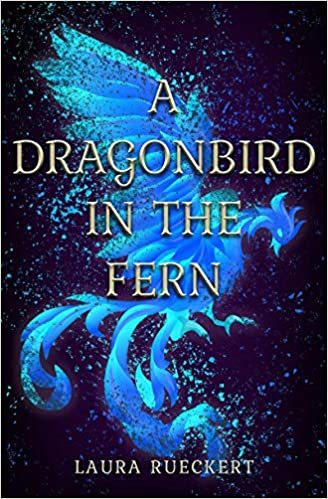 Author Laura Rueckert Says…
Describe the content of your latest book and what can readers expect from it.
Author Laura Rueckert Says…
Describe the content of your latest book and what can readers expect from it.A Dragonbird in the Fern is a YA Fantasy about a dyslexic princess named Jiara whose older sister Scilla is assassinated. Jiara takes her sister’s place as the bride to the young king of a faraway country, hoping she can catch Scilla’s murderer before her vengeful ghost kills their family. But that makes Jiara the assassin’s next target. Be ready for women and girls who rule countries, act as knife and javelin-wielding bodyguards, and are political strategists—and also men who care about what women think and don’t stand in their way.
As a debut author, what advice would you give aspiring authors who want to write but might be afraid to try to start their own written story?If you’re nervous, try not to pressure yourself. Create the story you want for yourself as a reader. No one else has to see it if you don’t want them to. Give yourself time; there’s no deadline by when you need to have it finished. When you start writing, the only person you need to satisfy is yourself.
What does feminism mean to you? How does a character in your book represent feminism?For me, feminism means everyone should have the same opportunities, and it means supporting, inspiring, and empowering everyone to be the best version of themselves. In A Dragonbird in the Fern, Jiara’s mother, the queen, rules their country. King Raffar wants to be certain Jiara is allowed to make her own decisions. And Jiara learns to trust herself, and that she is capable of much more than she ever believed.
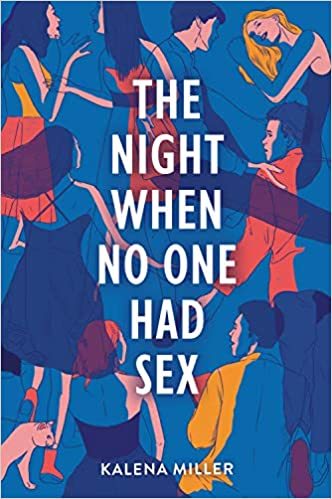 Author Kalena Miller Says…
Describe the content of your latest book and what can readers expect from it.
Author Kalena Miller Says…
Describe the content of your latest book and what can readers expect from it.The Night When No One Had Sex is a YA comedy coming out on September 7th from AW Teen. This sex-positive, all-in-one-night romp is about a group of friends who all vow to have sex the night after their senior prom…only everything goes disastrously wrong. Get ready for tender first kisses, high-stakes arguments about college decisions, way too much green body paint, and a cat named Bulldog. (Oh, right. Lots of sex too.)
As a debut author, what advice would you give aspiring authors who want to write but might be afraid to try to start their own written story?My advice is all very practical. Establish a writing ritual–however that may look for in your life–and value that time. Find critique partners you trust (and then trust them). If you’re able, attend workshops and classes. Develop an unhealthy caffeine habit. Don’t engage in self-deprecating modesty. I’m sure your writing is amazing, so own it!
What does feminism mean to you? How does a character in your book represent feminism?In this project, the aspect of feminism I embraced wholly is sex-positivity. As someone who grew up in Texas, I learned about sex from John Green novels. Similarly, my goal in this novel was to create a space where young readers can learn, question, and laugh about sex. I wanted to replace the shame and stigma with representations of teen sexual experiences that are safe, consensual, pleasurable, and empowering.
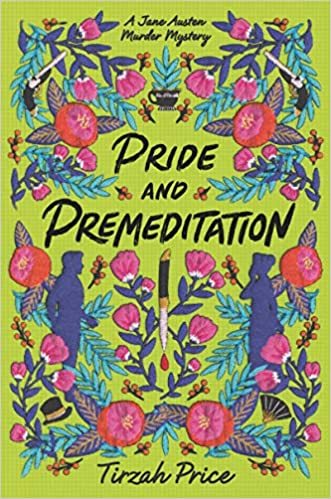 Author Tirzah Price Says…Describe the content of your latest book and what can readers expect from it.
Author Tirzah Price Says…Describe the content of your latest book and what can readers expect from it.Pride and Premeditation is a murder mystery retelling of Jane Austen’s classic Pride and Prejudice, with a feminist slant. The setting is ahistorical Regency London, and sees heroine Lizzie Bennet fighting to prove that she has what it takes to join her father in the family law firm–by solving a murder case!
As a debut author, what advice would you give aspiring authors who want to write but might be afraid to try to start their own written story?Start writing, and don’t be afraid if your ideas, story, or characters evolve along the way. When we start with an Mo idea, it always feels shiny and perfect inside our heads, but writing is messy and it can be frustrating. Embrace what’s fun about your story idea, and don’t be afraid to explore in order to find out what works.
What does feminism mean to you? How does a character in your book represent feminism?Feminism means equality for all, regardless of identity or expression. In order to achieve equality, we have to take into account the many intersections of identity and fight against oppression on all levels. Over the course of Pride and Premeditation, my Lizzie Bennet learns that there are worse inequalities in her world than men refusing to let her train in the legal profession, and she must confront how she is best equipped to fight those injustices.
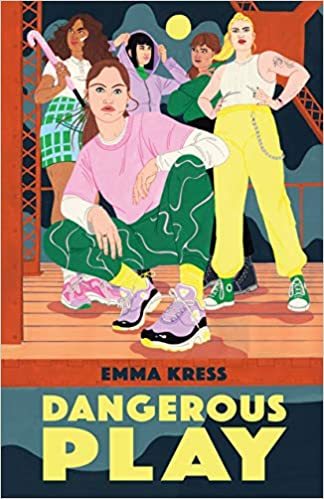 Author Emma Kres Says…Describe the content of your latest book and what can readers expect from it.
Author Emma Kres Says…Describe the content of your latest book and what can readers expect from it.Dangerous Play is about the captain of a field hockey team who is fierce on the field, but timid in life. When she gets sexually assaulted, she and her ride-or-die team turn into vigilantes. But it might cost them everything.
As a debut author, what advice would you give aspiring authors who want to write but might be afraid to try to start their own written story?I wasted years being scared to write. Now, I look back and wonder why I let that fear grip me so tightly. Remind yourself that you love to write, so write. Lean into the joy.
What does feminism mean to you? How does a character in your book represent feminism?I define feminism as equal rights regardless of gender. I embrace an intersectional feminism that recognizes that women who also face racism, transphobia, classism, and in addition to sexism will necessarily have different obstacles and experiences and we must take those into account. As women, we must work to lift and support all women. In Dangerous Play, I wrote a large and diverse cast for this reason. I wanted to explore the insidious and pervasive effects of sexual assault and rape culture, even when a rape isn’t the focus. I wanted to examine what happens to a group of girls and their community when rape culture goes unchecked.
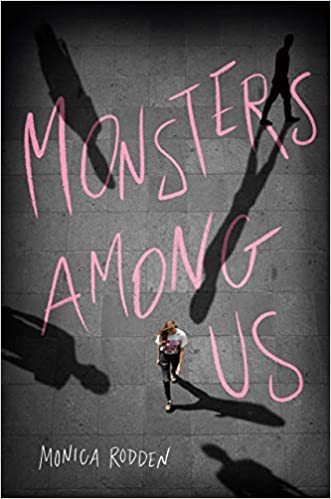 Author Monica Rodden Says…Describe the content of your latest book and what can readers expect from it.
Author Monica Rodden Says…Describe the content of your latest book and what can readers expect from it.Monsters Among Us is about a girl named Catherine who returns from her first semester at college, looking for a reprieve from a traumatic experience she cannot fully remember and hates to even think about. However, during winter break, tragedy strikes her small town, involving her in a mystery that leads, ultimately, to the beginning of healing.
As a debut author, what advice would you give aspiring authors who want to write but might be afraid to try to start their own written story?Believe in your story and believe in yourself. Ignore the voice in your head that says you can’t do it because that voice is a liar and your voice deserves to be heard above it. You have a story in you that only you can tell. Go one word at a time and I have no doubt you’ll get there.
What does feminism mean to you? How does a character in your book represent feminism?To me, feminism means breaking barriers put in place to make women small, malleable, and manageable. It means taking up space. Catherine literally and figuratively learns to take up space in Monsters Among Us, finding a path forward in a world where men, time and time again, have tried to corner and cage her. This stories confronts lies, and then it tells the truth–about rape, about trauma, and about toxic masculinity.
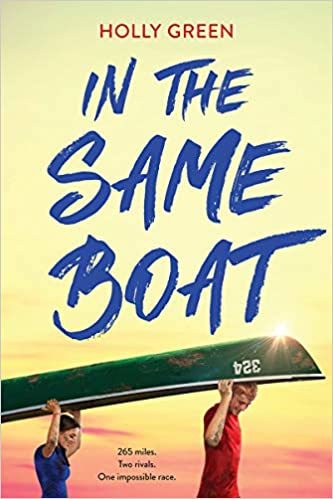 Author Holly Green Says…Describe the content of your latest book and what can readers expect from it.
Author Holly Green Says…Describe the content of your latest book and what can readers expect from it.In the Same Boat is about seventeen-year-old Sadie Scofield, who is determined to prove to her father and everyone else that she is tough enough to complete a 265 mile canoe race. But when she loses her partner the night before the race, she is forced to paddle with Cully, her former best friend turned worst enemy. It’s fast paced, full of mud and sweat, with a fierce protagonist and a swoony romance.
As a debut author, what advice would you give aspiring authors who want to write but might be afraid to try to start their own written story?Write something you’re excited about, something you would pick up off a bookshelf, and don’t worry about whether it is good or not—that’s the biggest thing. But also, study the craft of writing. Read a craft book or watch videos or listen to podcasts. Having more writing tools makes it easier to figure the story out and get it on paper
What does feminism mean to you? How does a character in your book represent feminism?To me feminism means equal opportunity and treatment for all, regardless of sex or gender identity or expression, keeping in mind that people face oppression because of other parts of their identity as well. It also means that we stop putting a box on what it is to be female. Our strengths, weaknesses, abilities, and interests are not defined by sex or gender. My main character, Sadie, fights to prove herself in a male dominated ultra-marathon canoe race, when most of the people around her expect her to fail without her dad or brother there to help her through it.
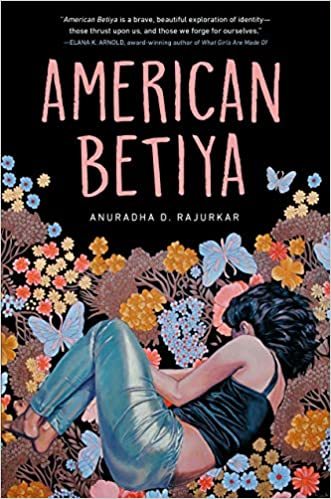 Author Anuradha D. Rajurkar Says…Describe the content of your latest book and what can readers expect from it.
Author Anuradha D. Rajurkar Says…Describe the content of your latest book and what can readers expect from it.American Betiya is a cross-cultural love story about 18-year-old Rani, who gets swept up in the euphoria of first love when she meets Oliver. But it’s the challenges they encounter as an interracial couple that allow her to recognize real love for what it is. It explores cultural fetishization, immigrant families, shifting personal boundaries and the complicated relationship between love and culture. It also features funny best friend banter, feminist badassery, sex-positivity, intergenerational experiences, and an illuminating trip to India.
As a debut author, what advice would you give aspiring authors who want to write but might be afraid to try to start their own written story?Read widely, especially outside the genre you are planning to write. Study the kinds of strategies that make certain books so impactful. Read books on the writing craft, and set up a writing schedule for yourself that is realistic and that you can stick to, shame-free. Finally, if you’re intimidated like I was at the idea of writing a novel, start small: write a scene between two characters, a character sketch, a poem or short story. Give yourself the space to fall in love with your characters. Use your characters to help you seek answers to your burning questions. Finally: no one’s voice is quite like yours, so value it. Give it the respect it deserves.
What does feminism mean to you? How does a character in your book represent feminism?To me, feminism means owning your identity, voice and decisions. Rani is the protagonist in my debut, American Betiya, who slowly begins to recognize over the course of the novel that the cultural conflict she experiences in her most intimate relationships leads her to make decisions that compromise her dignity and very identity. She learns the ways racism and misogyny crop up in places she least expects, and begins to lean on her friends and family in a celebration of feminist allyship.
April 1, 2021
SCBWI Success Story: An Interview with Anuradha Rajurkar
In 2017, Anuradha Rajurkar won the SCBWI Emerging Voices Award for a promising young adult manuscript exploring the themes of family, self-discovery, and the obstacles an Indian teen faces in her first cross-cultural relationship. This month, she celebrates the launch of her debut novel, (Knopf Books for Young Readers), which PW has called “a bittersweet, searingly honest view of an Indian American teenager’s journey through first love.” Rajurkar was kind enough to talk to us about her publishing journey as a newly-minted published author.

Many debut authors don’t end up selling the first novel they ever wrote. Was this your first manuscript or do you have others stashed in your desk drawer?
This actually was the first book I’ve ever written. It was the story I had in mind ever since I was a high schooler. Of course, it wasn’t completely fleshed out in my mind, but I kind of knew loosely some of the topics that would be explored in the book. It took 10 to 15 years of just thinking about it and dreaming, and then finally starting to write it as a short story.
I was very overwhelmed at the time because I had two young boys who are just 17 months apart. I was in the thick of being a mom and trying survive that, plus we had just moved to a new city. But I showed the story to my friend, Laura Fox (now a New York Times best-selling author) and she invited me to join her writing group. She suggested I flesh it out into a novel, and it was sort of the permission I needed to overcome my imposter syndrome. I wrote a 165,000 word story, which I had to cut to about half that length.
When did you realize that it was meant to be a YA novel rather than a literary short story?
I think there was a part of me that knew all along. Ever since I was young, that’s what I wanted to write. Young adult books meant so much to me–they were friends to me. They helped me work through so many things, and that became part of my fabric. And yet I didn’t feel like I knew exactly what I was doing. I just had a story in mind, and I was reading a lot of Alice Munro and James Baldwin—adult literary fiction. It was actually my writing group that said the voice felt more YA. Again, it was almost like permission that I was being given by my writing group, who I trusted, to go forth and try it as YA.
What were some of those influential books you read as a teen?
Bridge to Terabithia, Tuck Everlasting, and anything by Judy Blume. Forever was a book that really stayed with me. Especially the exploration of sexuality and the fact that high school relationships don’t always end in happily ever after.
How did you channel the voice of your teen protagonist Rani?
It was a little bit of a trial and error. You know, there were times I would bring a scene to my writing group and immediately somebody in the group would say, The voice feels off. Sometimes I would practice creating character sketches or writing a throwaway scene to get the voice right. I think it helps that I have such a close connection with the things Rani goes through. Even though this is very much a work of fiction, I understand the emotions and the themes that she struggles with–not just me, but people that I knew in high school and even into adulthood, people who really dealt with some of the things she deals with.
What themes were you trying to explore with American Betiya?
I was really longing for story that explores the balancing of two or more cultures that so many teens of the diaspora navigate, especially the nuances of cross-culture relationships and the role that race plays in our everyday experiences. There’s a sense that racism is about hate crimes, strangers yelling racial slurs, and being overtly cruel. But often, especially in some of our liberal cities, it is actually much more subtle than that. It takes the form of microaggressions, cultural gaslighting, and cultural fetishization, which is a form of objectification. I feel like that’s a nuance that’s so important to detail in YA, whether it’s with friendships or romantic relationships.
It’s so easy to question yourself because of the nature of microaggressions. It can feel mild sometimes, so you tell yourself They’re just joking or That person doesn’t know any better. I think that was the one thing I really wanted to do in the story, which is to create an understanding of those red flags. When Rani meets [her love interest in the book], she’s very taken with him because he’s charming, even when he says things that make her feel like something isn’t quite right.
I think as women from a young age, we’re conditioned to want to be the best. That’s the significance of the title, American Betiya. ‘Betiya’ is a term of endearment, often for a daughter. So to be the best girlfriend or significant other, best friend, best grandchild—there’s a lot of pressure to fulfill those expectations society puts on you. And maybe that happens with men and boys as well, but from my perspective as a woman, I think it’s really widespread. In an effort to try to be everything to everybody, it’s so easy to lose yourself.
And you don’t have to be of South Asian descent to understand that element in the story–I think that many of us can relate to that. How far are we willing to go to make compromises for the ones we love?
What’s the story behind the gorgeous cover for American Betiya?
It’s just beyond my wildest dreams. And honestly, it came from me perusing Instagram and looking at all these beautiful, amazing artists that are posting their work there. That’s how I found Saqiba Suleman, who created the work of art on the cover. It’s actually a piece of art that is hanging in a gallery in Pakistan. I reached out saying, Gosh, this really reminds me of my main character, Rani, and I attached a little blurb about what reminded me of her. And my editor saw that post. We actually had a different cover in mind at the time–I thought it was set in stone, and I wasn’t 100% feeling like the cover reflected the story that well, though I had accepted it. But after the Instagram post, my editor reached out to me and said, What do you think about us trying to change the cover to this one?
My agent was actually made sure there was a clause in my contract saying that I, as an Own Voices author, should have input on the cover. I was really grateful that he did that because I was consulted from the beginning, and while the first cover wasn’t perfect for me, I still had a lot of input in terms of making small changes. So when my editor emailed me about changing the cover, I thought how amazing it was to have an editor who’s so sensitive to my vision. It was a really special and exciting moment to realize that.
Do you have any suggestions for writers who want to be traditionally published?
The very beginning of everything for me was SCBWI. When I first joined, had just moved to Milwaukee, my kids were really young, and I didn’t know anybody. I attended some regional conferences and the classes were really eye opening. It was such a supportive vibe, especially knowing there was something in my state. It started to feel like this was something I could actually do. So that’s the baseline.
Secondly, find critique partners who are supportive but who also give constructive feedback. I know everybody’s process is different, but I feel that for myself, there is no way I would send things to my agent until many, many people have read those pages. Then, I would say it’s important to research agents carefully through Publishers Marketplace and Manuscript Wishlist.
Finally, how are you going to be promoting your book–especially considering the lack of in-person author visits because of the pandemic?
Lots of social media. Twitter and Instagram is where I feel I get the most engagement, and where it feels the most comfortable for me. I’d like to get more into TikTok, because it’s fun and silly. I recently made my first TikTok, which is of me struggling to open my box of books—a little reflection of who I am.
I did my official book launch party through Boswell Books online with my dear friend and best-selling author, Lauren Fox on March 9. The rest of my events are on IG Live: On March 11, I’ll be in conversation with Kathleen Glasgow at 8 pm EST, March 14th with Dr Gayatri Sethi, aka Desi Book Aunty, and the 16th will be with Adiba Jaigirdar, author of The Henna Wars. I’d love to see all my SCBWI friends there!
March 27, 2021
Balancing Darkness with Light in Literature by the Class of 2k21 Books
Balancing Darkness with Light in Literature By Anuradha D. Rajurkar and the Class of 2k21books
Literature has always served as a safe space for readers to explore darker themes, ones that can provide a window into other worlds, or act as mirrors of their own. Young adult and middle grade books today--perhaps now more than ever-- delve deep into challenging issues that kids and adults alike already manage daily in some form. And while we as authors strive for truth and raw honesty in our stories, we also aim to imbue them with hope and joy, striking that perfect balance between the darkness and the light.
In my own debut titled AMERICAN BETIYA, South Asian American teen, Rani Kelkar, finds herself falling into an intoxicating, forbidden relationship with the charismatic but damaged Oliver. The highs of new love along with a hilariously jaded but approving best friend are the elements I hoped will balance the racism, stereotyping, and patriarchy that Rani begins to encounter in places she least expects it.
Curious to learn how others used elements of lightness to balance darker themes within their stories, I interviewed fellow class of 2k21 authors Louisa Onome, J. Elle, Joan F. Smith, and Jessica Vitalis. Here are their insightful thoughts.
Jessica Vitalis: I love this question because THE WOLF’S CURSE is a middle grade novel in which a twelve-year-old boy loses everything—his beloved grandpapá, his home, and his livelihood. I tried to balance a realistic portrayal of his grief with an action-packed plot so that readers don’t feel overwhelmed by the magnitude of his loss. In addition, my snarky, omniscient narrator brings levity to a topic that otherwise might feel too heavy. I think we sometimes don’t give young readers enough credit for the topics they can (and often want to) read about; we can’t protect them from the real world, but we can give them a safe space to explore difficult subject matters.
Louisa Onome: It’s difficult to ensure I’m being truthful while offering space for hope when tackling tough issues. I faced this issue a lot while writing LIKE HOME. I think the most important thing to remember is that young people understand a lot more of their circumstances than we, as adults, might give them credit for. In my story, my main character Chinelo often comes face-to-face with those older than her who think she doesn’t have the full story or that she’s being naive, which bothers her. Remembering that young people who deal with tough issues on a daily basis aren’t naive about their situations is important. They’re living a different reality, one that’s completely valid.
Joan F. Smith: I think about the juxtaposition of lightness and darkness for “issues” a lot. The death of a parent, for example, is a traumatic event for anyone, and the younger you are, the more that can be true. That said: Grief is not a linear process. We need moments of levity to remind us what joy feels like. We need moments of sadness and sorrow to remind us of the importance of life and human relationships. When I was a kid suffering from the near-loss of my father to a suicide attempt (that became a real loss six years later), I was so startled by the depths of grief, and I was desperate for a way to climb out of it. It felt like I needed permission to laugh or be happy. In my book THE HALF-ORPHAN’S HANDBOOK, I gave my protagonist this permission. She uses humor as a way to wade through her grief the same way I wound up doing. I hope readers take away the reassurance that it’s okay to feel feelings on a huge spectrum. Right now, the entire world is suffering through a pandemic--a universal trauma. We need to fight its impact so that we can cling to the hope for brighter times ahead.
J.Elle: I don’t think young people get nearly enough credit for what they can handle. When I consider the things I and my teenage sisters saw/lived through, and compare that to all that’s on the shoulders of high school students growing up in this moment in American history, I’m inspired by them.
When writing WINGS OF EBONY or any YA pieces in particular, I also consider the state of the world when deciding how dark is too dark for a story to go. Today’s high schoolers are rehearsing active shooter drills, living amid a pandemic, witnessing (some even participating in) a worldwide uprising of protests after the murder of George Floyd. They are living these thematic realties and many are parched for a way to connect and process those events.
Literature can be a fantastic tool for that. I don’t want the message of my stories to be so buried in allegory that kids can’t relate to it. That said, I aim for balance. And hope is my method of choice. Part of the reason I enjoy writing in the fantasy space in particular is because as I explore these tougher themes in my stories, I want to equip characters in the most dire of circumstances with magic, as a metaphor for the reader’s own power. I love the balance of powerful magic in the face of a raw, gritty, reality. That juxtaposition can be so inspiring for students, particularly those who aren’t accustomed to seeing themselves on the page as a hero /heroine. I aim to write stories that validate my community’s challenges while showing them their resilient power in the face of it.
We at the Class of 2k21 books love honest stories that treat with care the tough topics we are all managing in some form as a society. At the same time, we also crave that sense of escapism and joy, and access them in our writing by utilizing the tools of action, humor, and above all, hope. Take a look at our debuts below if you, like us, revel in stories that explore darkness while also revealing the light that shines within us all. Thanks for reading! <3
With love and light,
Anuradha Rajurkar & The Class of 2k21
Pre-order Joan F. Smith’s THE HALF-ORPHAN’S HANDBOOK here
Add THE HALF-ORPHAN’S HANDBOOK here
Pre-order Louisa Onome’s LIKE HOME (February 23, 2021 | Delacorte Press) here
Add LIKE HOME on Goodreads here
Pre-order J. Elle’s WINGS OF EBONY (January 26, 2021 | Simon and Schuster) here
Add WINGS OF EBONY on Goodreads here
Pre-order Anuradha Rajurkar’s AMERICAN BETIYA (March 9, 2021 | Knopf ) here
Add AMERICAN BETIYA on Goodreads here
Add Jessica Vitalis’s THE WOLF’S CURSE on Goodreads here



